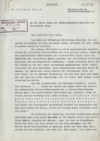A Bureaucratic Lump of Coal
It was December 25, 1936. While gifts were being unwrapped and eggnog enjoyed around the world, Thomas Mann received a letter in his Swiss exile. Instead of festive greetings, it contained a bureaucratic lump of coal: his honorary doctorate had been revoked. Merry Christmas, Mr. Mann! Nothing says "holiday cheer" quite like being stripped of an honor once proudly bestowed—this time at the behest of a totalitarian regime.
The decision was justified on the grounds that Mann’s German citizenship had already been revoked. Yet the writer refused to let this institutional humiliation dampen his holiday spirit or discourage him. That evening, he noted laconically in his diary: “Almost forgot: notification from the philosophy faculty in Bonn about the revocation of my honorary doctorate as a result of expatriation. – Response considered.”
The “response” soon followed and garnered international attention. In a letter that mercilessly exposed the absurdity of the situation, Mann wrote: “The mere realization of who holds the external power in Germany to revoke my citizenship reveals the grotesque arbitrariness of this action.” His message was clear: I am not the problem—you are. The letter was translated into several languages and even smuggled into Germany in an illegal disguised edition—a quiet triumph of resistance.
Christmas as a Focal Point
For Thomas Mann, Christmas always held deeper significance beyond tinsel and Lübeck marzipan. It represented a cultural and emotional anchor. In BUDDENBROOKS and THE MAGIC MOUNTAIN, he dedicated entire chapters to the holiday, holding up a mirror to bourgeois superficiality. His diaries are filled with warm memories of family celebrations: children singing by candlelight in darkened rooms, carefully chosen gifts, and festive meals rivaling those of Michelin-starred restaurants. On December 25, 1933, he noted: “The children, asked late last night what the best part of Christmas had been, replied: ‘When Mr. Papa imitated a Jew at dinner!’” A memory that, viewed through a modern lens, might cause discomfort—worthy of a separate blog post.
Exile changed everything. During the 1930s and 1940s, Mann celebrated Christmas not in his homeland of Germany but in Switzerland and later Los Angeles, where snow and fir trees gave way to sunshine and palm trees.
Christmas as a Moral Appeal
For Thomas Mann, Christmas in exile became a metaphor for the humanistic values that Nazism sought to destroy. In his December 1940 radio address LISTEN, GERMANY!, he portrayed the holiday as a profound cultural anchor: “Perhaps Christmas is the most German of all holidays.” He recalled its origins in pagan solstice rituals and its transformation into a Christian festival of peace, sharply contrasting it with the grim reality of the so-called “Third Reich.”
“How do your leaders’ actions appear in the light of these candles—actions of madness, violence, and destruction to which they have made you complicit?” Mann asked his listeners with biting irony—likely causing some Germans to choke on their holiday liqueur. He added: “Do you still sing ‘Silent Night,’ or have you been ordered to sing some bloody party anthem instead?”
Cultural Resistance: Tradition as a Weapon
Thomas Mann understood that traditions like Christmas could be powerful tools of cultural resistance. By continuing German holiday customs even in exile, he reclaimed them from Nazi clutches. He reminded his audience that Germany’s true heritage lay not in violence and ideology but in its contributions to art and culture: “the works of Dürer and Bach, Schiller’s poems of freedom, Goethe’s Iphigenia, Beethoven’s Fidelio.” To Mann, this legacy was irreconcilable with Nazi barbarism.
The Enduring Flame of Resistance
As people today celebrate these holidays amidst ongoing global crises—from wars displacing millions to rising authoritarianism—Mann’s words remain strikingly relevant. His appeal from exile echoes across decades: “German people, save yourselves! Save your soul by renouncing those who think only of themselves and not of you.”
For Thomas Mann, Christmas transcended quiet reflection and festive traditions. It became a powerful symbol of resistance against injustice, a steadfast defense of humanist values. His example still reminds us today that even in the darkest hours, we can uphold truth, dignity, and humanity.
About Thomas Mann's correspondence with the Philosophical Faculty of the University of Bonn (1936/1937)
In December 1936, Thomas Mann, then living in exile in Switzerland, received a letter from the University of Bonn informing him that his honorary doctorate had been revoked. This decision was justified by the Nazi regime's prior revocation of his German citizenship. In response, Mann wrote a sharply worded open letter on New Year’s Day 1937, denouncing the Nazis' presumption to equate themselves with German culture.
On January 15, 1937, the correspondence was published by the Zurich-based publisher Oprecht under the title EIN BRIEFWECHSEL. It quickly became a symbol of resistance, widely disseminated and translated into multiple languages. In Nazi Germany, it circulated covertly under the title BRIEFE DEUTSCHER KLASSIKER. Mann’s reply remains a landmark document of exile literature and intellectual defiance against tyranny.
Image: Universitätsarchiv Bonn, © S. Fischer Verlage, Frankfurt am Main

About LISTEN, GERMANY!
Thomas Mann's "DEUTSCHE HÖRER!" (LISTEN, GERMANY!) broadcasts, delivered via the BBC between 1940 and 1945 during his American exile, stand as a remarkable act of literary and moral resistance. As Germany's most prominent literary exile and a Nobel laureate, Mann used these monthly eight-minute addresses to counter Nazi propaganda and speak directly to the German people. He delivered 58 speeches that exposed Nazi crimes and urged resistance against Hitler's regime. Over time, Mann's tone shifted—from viewing Germans as victims of Nazi oppression to confronting their collective responsibility for the regime's atrocities. These broadcasts remain a vital historical record of German exile resistance and an enduring testament to the power of words in the fight for justice.
Image of the new German edition, published by S. Fischer Verlag on January 29, 2025. Learn more here!

About the author
Mirko Lux is the former editor and coordinator of MANN 2025: 150 YEARS OF THOMAS MANN. From 2013 until June 2025, he served as Program and Communications Officer at the Berlin office of Villa Aurora & Thomas Mann House. He now works as Officer for Science Communication at the Max Planck Institute for Comparative Public Law and International Law in Heidelberg. Lux studied Modern German Literature and Art History in Berlin and Siena and previously worked as a freelance journalist and photographer.
Image: © Tobias Kruse/OSTKREUZ


